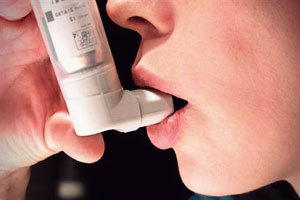Allergies and asthma are not the same thing but the two conditions are closely related. Allergens are the cause of an allergy attack. In some cases the allergens can take the attack one more step and asthma occurs. When this happens the condition is called allergic asthma.
There are many types of allergens; they can include dust, animal dander, mites, pollen, smoke, and mold, just to name a few. Exercise can exacerbate the condition. The condition can be so irritable that a working knowledge of allergy and asthma care can save you some grief. The following are a sampling of treatments your doctor might suggest.
Allergy-Triggered Asthma Treatment Options:
- Short-Acting Bronchodilators (Rescue Inhalers). These are quick-acting, a real Johnny-on-the-spot solution. It’s always a good idea to pack one and the effects can last 4 to 6 hours. They function by dilating, or opening up, the airways leading to your lungs.
- Long-acting Bronchodilators. These are similar to the short-acting models except that a dose is good for about 12 hours so 2 treatments per day are required. Your doctor will most likely also prescribe inhaled steroids.
- Inhaled Corticosteroids. These are a step up in strength from the above-mentioned inhalers. A key benefit is that they can assist in keeping your lungs functioning better following future asthma attacks.
- Anti-Leukotriene Medications. there are many pills that inhibit leukotrienes, which are molecules that trigger inflammation in your airways. Some pills are more popular than others, check with your allergist specialist for which pill is best suited for your situation.
- Antibody Treatments. These are considered a a last-resort medication for asthma that hasn’t responded well to other treatments.
Avoiding Allergens in the First Place:
As much as it is possible, it benefits the sufferer to avoid allergens so as to minimize the amount of allergy and asthma care needed. In the seasons where the amount of pollen is high, try to stay indoors as much as possible. Refer to the daily allergen count on your local weather website.
Be sure that your HVAC return air filter has a filtration rating that your condition warrants. Don’t smoke or allow smoking in your home. Try to avoid contact with pets during an asthma attack. Dander is not your friend.
For more information on allergy-triggered asthma and the treatment options that are best suited for your situation, contact your local clinic. Our allergy and asthma clinics are located for our patient’s convenience and we are bilingual English/Spanish.

No comments:
Post a Comment